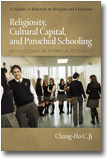
Religiosity, Cultural Capital, and Parochial Schooling
Psychological Empirical Research
By:
Chang-Ho C. Ji, La Sierra University
A volume in the series: Research on Religion and Education. Editor(s): Larry Burton, Andrews University. Anthony J. Dosen, DePaul University, Chicago.
Published 2010
This book examines whether or not and how personal religion associates with school cultural capital. Specifically, on one level, the book offers insights and empirical data on who is choosing, teaching, and working in parochial schools and what motivates them to do so in the schools, issues that still remain largely unexplored in the educational research literature. In particular, it centers on the significance of personal religion and commitment as a reason for choosing and serving in parochial schools. On another level, the book is an attempt to enhance our understanding of the leadership orientation, school satisfaction, teacher assertiveness and empowerment, educational aspiration, and parental involvement in parochial schools, attributes reportedly essential for successful schools. Most importantly, at the heart of the book is an endeavor to estimate the influence of personal religion on the development of these cultural capital attributes and to address its implications for parochial schools as well as the current discussion on public schooling versus parochial schooling in the United States. To achieve these goals, the author will rely on first-hand empirical data collected for this book or other related research projects and adopt various scientific methods for data analysis and interpretation.
The book shows that personal religion matters, but its impact is weaker than thought and is largely restricted to the students and parents in parochial schools, rather than their educators. To the extent that parochial schools excel more than public schools, personal religion seems to be responsible for the development of student and parent-level cultural capital such as parenting style and student desire for academic success and favorable attitude toward school, yet it does not necessarily engender the growth of teacher and administrator cultural capital. This result, to some extent, comes as a surprise but corrects and enhances our understanding about whether or not and how religion affects academic achievement.
This book is an inquiry into the issue of school success and cultural capital, representing a scholarly contribution to the fields of education, religion, psychology, and sociology. Both scholars and lay people of education and religion will find this book a useful, informative, and insightful reference and classroom textbook.
CONTENTS
Preface. Acknowledgments. Editor’s Foreword. Foreword. Introduction. 1 State of Parochial Schooling. 2 School Leadership Orientation, with Soon-Chiew Shee and Ed Boyatt. 3 Student Leadership Orientation, with Jamie V. Bird and Ed Boyatt. 4 Teacher Assertiveness and Empowerment, with Mark Haynal. 5 Teacher Job Satisfaction and Retention, with Cheryl R. Rolle. 6 Student Satisfaction and Academic Aspiration, with Dora Clarke-Pine and Jerry Pine. 7 Parental Involvement in Student Homework. Conclusion. References
-
Paperback978-1-60752-380-2
Web price: $45.04 (Reg. 52.99)
-
Hardcover978-1-60752-381-9
Web price: $80.74 (Reg. 94.99)
- eBook9781607523826

- EDU037000 - EDUCATION: Research
- REL000000 - RELIGION: General
- EDU001000 - EDUCATION: ADMINISTRATION: General
-
 American Evangelicals and Religious Diversity
Subcultural Education, Theological Boundaries, and the Relativization of Tradition
American Evangelicals and Religious Diversity
Subcultural Education, Theological Boundaries, and the Relativization of Tradition
-
 Anchoring Cultural Change and Organizational Change
Case Study Research Evaluation Project All Hallows College Dublin 1995-2015
Anchoring Cultural Change and Organizational Change
Case Study Research Evaluation Project All Hallows College Dublin 1995-2015
-
 Catholic Higher Education in the 1960s
Issues of Identity, Issues of Governance
Catholic Higher Education in the 1960s
Issues of Identity, Issues of Governance
-
 Catholic School Leadership
Catholic School Leadership
-
 Catholic Schools in the Public Interest
Past, Present, and Future Directions
Catholic Schools in the Public Interest
Past, Present, and Future Directions
-
 Faith Formation of the Laity in Catholic Schools
The Influence of Virtue and Spirituality Seminars
Faith Formation of the Laity in Catholic Schools
The Influence of Virtue and Spirituality Seminars
-
 Religion, Education and Academic Success
Religion, Education and Academic Success

